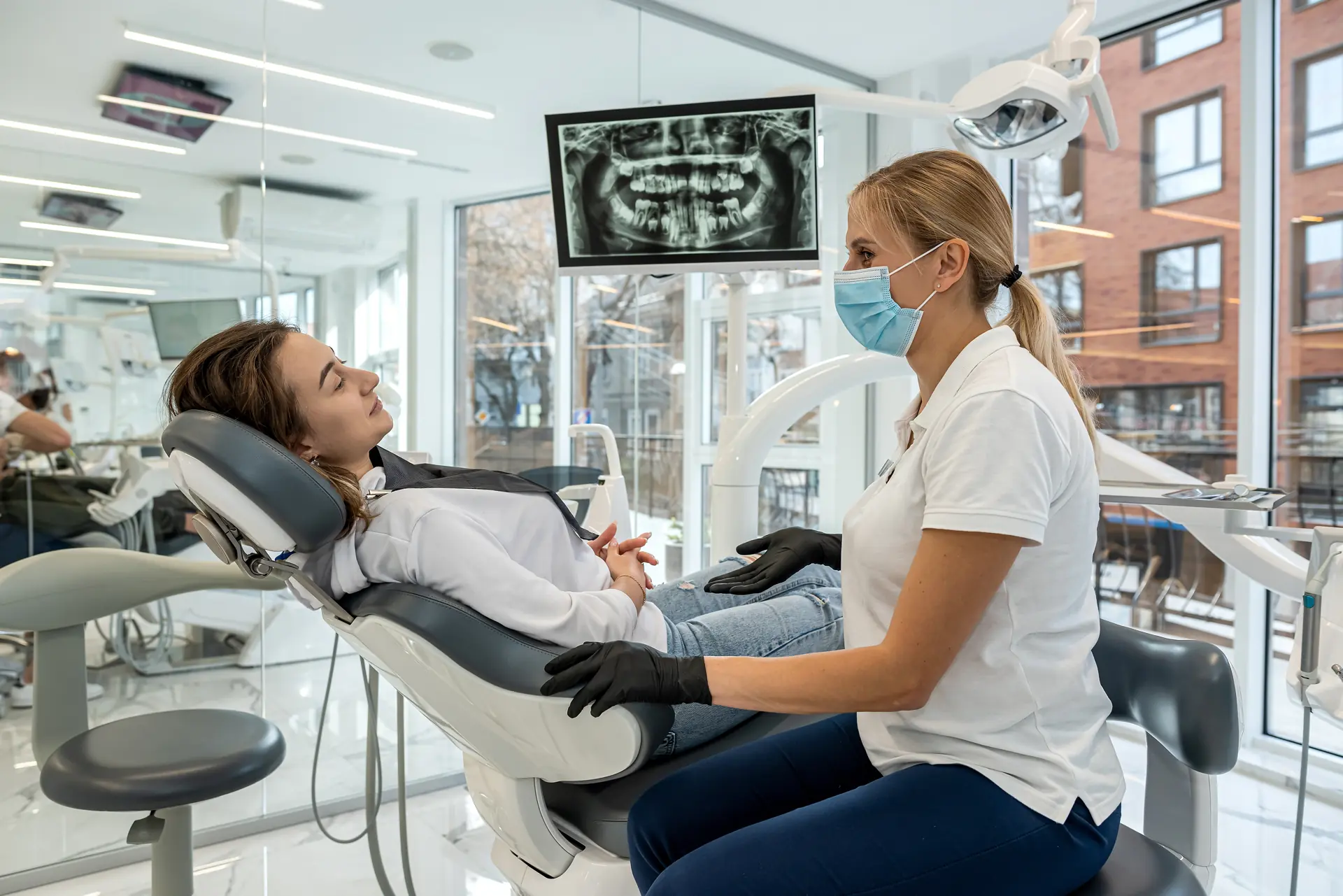That quick check-up you’ve been putting off? It might be doing more than keeping your smile in shape. A routine visit to your general dentist can actually help catch health problems before they turn into full-blown emergencies. We’re talking about things like infections, high blood pressure signs, even early signs of oral cancer—stuff you wouldn’t expect your dentist to spot, but they often do.
Dentists don’t just look at teeth; they’re trained to spot subtle signs that something bigger might be going on. And since most of us see our dentist more often than our doctor, those regular appointments can play a key role in keeping your overall health in check. Skipping those visits doesn’t just risk cavities—it could mean missing the early warning signs your body’s trying to send.
How Do Routine Dental Checkups Help Detect Early Signs of Serious Health Issues?
Dental checkups are more than just about making sure your teeth are in good shape—they’re also an important screening tool for identifying underlying health problems. Regular visits allow your dentist to look for subtle signs that may indicate a larger health issue, some of which you may not even be aware of.
Here’s how your dentist helps detect early signs of serious health conditions:
- Gum Disease and Heart Health: One of the most well-known connections between oral health and overall health is the link between gum disease and heart disease. Inflammation in the gums, often caused by untreated gum disease, can contribute to the narrowing of blood vessels, increasing the risk of heart disease. Your dentist can identify gum disease during a routine check-up, allowing you to seek medical advice before it leads to serious cardiovascular issues.
- Oral Cancer: Dentists are trained to check for signs of oral cancer during routine exams. Early-stage oral cancer can be difficult to detect without professional help, and by the time most people notice symptoms, the disease has often progressed. Catching oral cancer early is crucial for successful treatment, and your dentist plays a key role in identifying abnormalities such as lumps or sores in the mouth or throat.
- Diabetes Detection: Many people don’t realize that dentists are often the first to detect signs of diabetes. One of the earliest symptoms of diabetes is persistent gum disease, which can cause bleeding gums, dry mouth, or infections that don’t heal properly. By recognizing these signs, your dentist can recommend further testing to confirm whether you have diabetes, which could ultimately prevent more serious complications like nerve damage or kidney disease.
- Sleep Apnea: Dentists are also on the lookout for signs of sleep apnea, especially if they notice teeth grinding, jaw clenching, or an abnormal bite during your exam. Sleep apnea can significantly impact your health if left untreated, increasing your risk for high blood pressure, heart disease, and stroke. If your dentist spots any signs of this condition, they can refer you to a sleep specialist for further evaluation and treatment.
These are just a few examples of how regular dental checkups can provide crucial information about your health. Your dentist is often the first line of defense against serious conditions that may otherwise go undetected until they become medical emergencies.
What Medical Conditions Can a General Dentist Identify During a Regular Exam?
You might be surprised to learn that a routine dental exam can identify a range of medical conditions that go beyond just dental health. Here are some of the most common medical conditions your dentist can spot:
- High Blood Pressure: Some dental offices routinely take your blood pressure as part of the check-up process. High blood pressure, which is often referred to as the “silent killer,” can lead to serious health issues like heart disease and stroke. If your dentist notices any signs of high blood pressure during your visit, they can recommend that you follow up with your doctor for further testing.
- Osteoporosis: Dentists often examine the bone structure in your mouth, and signs of bone loss in the jaw can be an indication of osteoporosis, a condition where bones become weak and brittle. Early detection of osteoporosis can allow you to take preventive measures, such as medications and lifestyle changes, to reduce the risk of fractures and bone loss in other parts of the body.
- Nutritional Deficiencies: Your dentist can detect signs of certain vitamin deficiencies, particularly vitamin D or B12, based on the condition of your gums, tongue, and mouth tissues. A healthy mouth is a reflection of a healthy body, and any changes in the way your oral tissues appear might be a clue that something is lacking in your diet.
- Stress and Anxiety: If your dentist notices signs of teeth grinding (also known as bruxism) or jaw clenching, it could be a sign of stress or anxiety. Chronic bruxism can lead to tooth damage, jaw pain, and headaches. By addressing the underlying stress or anxiety, your dentist can help prevent further oral health issues and encourage a healthier lifestyle.
- Thyroid Problems: Dental professionals may spot signs of thyroid dysfunction based on the condition of your gums, teeth, or tongue. For example, hypothyroidism can lead to dry mouth and increased tooth decay. If your dentist notices these symptoms, they may refer you to an endocrinologist for further testing.
- Autoimmune Conditions: Certain autoimmune diseases, like lupus or rheumatoid arthritis, can affect the mouth and jaw. For instance, dry mouth, gum inflammation, and painful ulcers are common symptoms of autoimmune disorders. Detecting these issues early can help you seek treatment before they lead to more serious health complications.
As you can see, your dentist can serve as a key partner in identifying conditions that extend beyond the mouth. A routine exam is more than just a cleaning; it’s an opportunity to catch early warning signs of potentially serious medical issues.
How Does Maintaining Oral Health Reduce The Risk Of Medical Emergencies?
Maintaining good oral health isn’t just about keeping your smile looking bright—it’s a vital component of your overall health. Poor oral hygiene has been linked to a number of serious medical conditions, and by maintaining good oral care habits, you can significantly reduce your risk of medical emergencies.
Here’s how taking care of your teeth and gums can help keep you healthier:
- Prevention of Gum Disease: Gum disease, or periodontal disease, is a chronic infection of the gums that affects nearly half of American adults. If left untreated, it can lead to tooth loss, but it also increases the risk of other health issues like heart disease, diabetes, and stroke. Regular dental checkups and good oral hygiene practices, such as brushing and flossing daily, can help prevent gum disease and its associated health risks.
- Better Control of Blood Sugar: People with diabetes are more likely to develop gum disease, which can worsen blood sugar control. Maintaining good oral health can help manage diabetes better, reducing the risk of complications such as nerve damage, kidney disease, and vision loss. By seeing your dentist regularly and keeping your teeth and gums in good shape, you’re taking one step toward better control of your diabetes.
- Reduced Risk of Heart Disease: As mentioned earlier, gum disease is linked to heart disease, and regular dental visits can help reduce this risk. By addressing gum disease early, you’re also taking steps to protect your cardiovascular health, preventing more serious heart-related emergencies in the future.
- Preventing Tooth Loss: Poor oral health can lead to tooth decay, which may eventually result in tooth loss. Not only does this affect your appearance and self-esteem, but it can also impact your ability to chew properly, leading to digestive issues. Regular dental check-ups help catch problems early, allowing for timely interventions that can prevent tooth loss and the need for costly restorative treatments.
- Early Detection of Systemic Diseases: As we discussed earlier, routine dental exams can help detect early signs of systemic diseases like cancer, diabetes, and autoimmune disorders. By addressing these conditions early, you reduce the risk of more severe complications and medical emergencies.
By maintaining oral health and visiting your dentist regularly, you’re doing much more than just keeping your teeth clean. You’re actively reducing your risk of developing serious medical conditions that can lead to emergencies and long-term health complications.
Why Is It Important to Visit a General Dentist Regularly For Overall Health?
While it’s easy to think of dental visits as a luxury or an afterthought, regular check-ups are crucial to maintaining your overall health. The American Dental Association recommends seeing your dentist at least twice a year for routine exams and cleanings, but some individuals may need more frequent visits depending on their oral health needs.
Here’s why regular visits to your general dentist are so important:
- Prevention is Key: As the old saying goes, “An ounce of prevention is worth a pound of cure.” Regular dental visits allow your dentist to detect and address potential problems before they become major health issues. This proactive approach can save you time, money, and discomfort in the long run.
- Early Detection of Serious Health Issues: Your dentist is trained to spot signs of health conditions that may not be immediately obvious to you or your other healthcare providers. Routine visits give your dentist the opportunity to catch early warning signs of conditions like diabetes, heart disease, and cancer, giving you a better chance of managing or treating them effectively.
- Personalized Care and Advice: Regular dental visits allow you to build a relationship with your dentist, who can offer personalized care and advice tailored to your unique health needs. Whether you’re struggling with tooth sensitivity, gum inflammation, or an ongoing health condition, your dentist can guide you on how to improve your oral care habits and manage any concerns.
- A Healthier, Happier You: There’s no denying that a healthy smile boosts your confidence and quality of life. By taking care of your oral health, you’re not just improving your appearance—you’re investing in your overall well-being.
Routine dental check-ups are far more than just about keeping your teeth in great shape. They’re an essential part of maintaining your overall health and can help detect early signs of serious medical conditions before they escalate into emergencies. By visiting your general dentist regularly, you’re making a proactive choice to reduce your risk of health complications and ensure a happier, healthier future.
Discover the Difference at River District Dentistry Smiles – Your Health Starts Here!
At River District Dentistry Smiles, we believe that your dental care should be a reflection of your overall well-being. Our experienced team provides more than just routine checkups and cleanings—we focus on identifying early signs of health issues that can lead to serious complications. Whether you’re in need of a routine exam, preventive care, or specialized treatments, our comprehensive services are designed to keep your mouth and body healthy.
Schedule an appointment with us and experience how our proactive approach to dental care can benefit your entire health. Your smile—and your overall health—deserve the best care!


